Catégories
|
Thésaurus IAMM > RESSOURCE EN EAU
RESSOURCE EN EAUSynonyme(s)Ressource hydriqueVoir aussi |
Documents disponibles dans cette catégorie (847)
 Ajouter le résultat dans votre panier Affiner la recherche
Ajouter le résultat dans votre panier Affiner la recherche
Article
F. Mansour ; M. Al-Hindi ; M. Abou Najm ; A. Yassine |The increasing demand for resources has intensified the need for integrated management strategies that ensure resource sustainability and security. This study presents a holistic case study of the water-energy-food nexus (WEFN) in Lebanon, optim[...]
Article
F. Valenti ; M. Bustamante ; G. Mancuso ; A. Toscano ; J. Zhuang ; D. Zilberman ; W. Liao |This study applied a three-step approach, data collection and sorting, GIS-based analysis, and technical analysis to evaluate the food, water, and energy systems in Europe. It explores a FEW nexus solution based on maize, wheat, and rice product[...]
Article
S. Zainali ; S. Ma Lu ; Y. Bellone ; P.E. Campana |Agrivoltaic (APV) systems enable the co-production of food and solar energy, yet their optimal design depends on complex interactions among climate, crops, and policy frameworks. This study introduces a multi-objective optimisation framework tha[...]
Article
A.E.K. Vozinaki ; I.V. Anyfanti ; G.P. Karatzas ; E.A. Varouchakis ; C. Ceseracciu ; G. Branca ; R. Deriu ; P.P. Roggero ; I.D. Çetinkaya ; C.I. Aydin ; N. Copty ; S. Jomaa |Competing demands from agriculture and tourism place significant strain on water governance in Mediterranean regions, highlighting the need for more inclusive and adaptive management strategies. This study examines participatory water governance[...]
Article
Water diplomacy provides a way to manage shared water resources through inclusive, cooperative, and flexible methods. In the Nile Basin, the Grand Ethiopian Renaissance Dam (GERD) has become a key point of regional tension. It highlights the com[...]
Article
N. Nsiri ; G. Kleftodimos ; S. Drogué |Context: To improve agricultural productivity and water sustainability in water-scarce regions, it is essential to understand the efficiency and diversity of farming practices: Objective: This study aims to assess the diversity and efficiency of[...]
Article
E. Sedighi ; H. Golzar ; B.D. Fath ; A. Kharrazi ; E. Rovenskaya |This study investigates the systemic interconnections among the Water, Energy, and Food (WEF) sectors within the Tigris and Euphrates River (TigER) basin, focusing on the historical trajectories and resource competition among its four main ripar[...]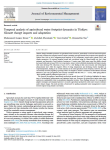
Article
M.S. Demir ; A. Muratoglu ; V. Kartal ; H. Nas |Climate change intensifies pressures on agricultural water resources, particularly in arid and semi-arid regions. This study evaluates the interplay between climate variability and agricultural water footprint (WF) dynamics in Türkiye from 1990 [...]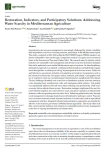
Article
Agricultural water resource management is increasingly challenged by climate variability, land degradation, and socio-economic pressures, particularly in the Mediterranean region. This study, conducted in 2023-2024 within the REACT4MED project ([...]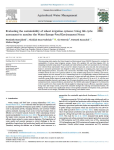
Article
This pioneering study employs the Water-Energy-Food-Environment Nexus (WEFEN) framework to evaluate the sustainability of various wheat irrigation systems—furrow (FI), sprinkler (SI), and drip irrigation (DI)—by integrating renewable energy (sol[...]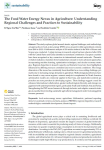
Article
This study explores global research trends, regional challenges, and methodological approaches in food-water-energy (FWE) nexus research within agricultural contexts from 2000 to 2024. A bibliometric analysis of 929 articles indexed in the Web o[...]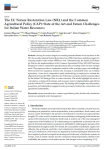
Article
A. Manzoni ; M. Hamam ; G. Pastorelli ; L. Servadei ; S. Chiappini ; A. Pesce ; S. Tarangioli ; R. Pergamo |Among its various targets on restoring natural habitats and ecosystems in the EU, the recently adopted Nature Restoration Law (NRL) introduces ambitious targets for restoring surface water bodies (SWBs) as well. Simultaneously, the Italian CAP S[...]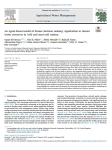
Article
I. El Fartassi ; A.E. Milne ; H. Metcalfe ; R. El Alami ; A. Diarra ; V. Alonso-Chavez ; J. Zawadzka ; T.W. Waine ; R. Corstanje |The study presents an agent-based modelling framework that integrates behavioural and biophysical models to investigate shared irrigation water management in an arid region. The behavioural model simulates farmers' decisions about their water ir[...]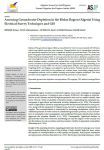
Article
N. Mebrek ; A. Noui ; Z. Guesbaya ; M. Kameli ; R. Hadji |The agricultural region of Biskra, characterized by very low annual rainfall (150 to 200 mm), suffers from limited availability of renewable water resources. These unfavorable natural conditions, combined with the expansion of agricultural activ[...]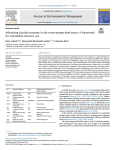
Article
This study presents a transformative approach to achieving near-zero CO2 emissions in a fossil fuel-based industrial region by integrating circular economy (CE) principles with water-energy-food (WEF) nexus optimization. Utilizing a linear optim[...]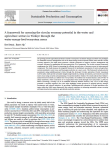
Article
The growing need for agricultural production and the consequences of climate change necessitate new paradigms for sustainable resource management such as the Water-Energy-Food-Ecosystem (WEFE) nexus and the circular economy approach. The WEFE ne[...]
Article
Y. Khardi ; Z.Z. Taleb ; A. Imache ; M. Kuper ; S. Bouarfa ; A. Hammani ; G. Lacombe ; A. Taky |Dans les zones oasiennes du Maroc, l’agriculture a connu une extension très importante depuis 30 ans en dehors des oasis, basée principalement sur l’exploitation des eaux souterraines et stimulée par des politiques agricoles volontaristes. Les o[...]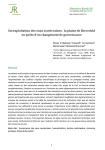
Article
Le présent article explore la gouvernance de l’eau à travers une étude de cas sur la plaine de Berrechid au Maroc. Cette région subit une pression croissante sur ses eaux souterraines, exacerbée par l’augmentation des surfaces irriguées (maraîch[...]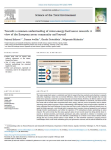
Article
The water-energy-food nexus is a relatively new field of research that has received much attention in research and policy. Applying a nexus lens can increase efficiency, reduce trade-offs, and build synergies that can help tackle future pressure[...]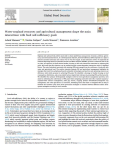
Article
A. Mamassi ; N. Guilpart ; L. Muneret ; F. Accatino |Regional and national food policies must seek to attain equilibrium among social, economic, political, agricultural, and environmental factors. As a developmental objective, food self-sufficiency (FSS) responds to a region's need for increased a[...]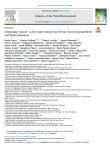
Article
E. Lucca ; D. Kofinas ; T. Avellán ; J. Kleemann ; C.E. Mooren ; M. Blicharska ; C. Teutschbein ; A. Sperotto ; J. Susnik ; S. Milliken ; M. Fader ; D. Dordevic ; T. Dasic ; V. Vasilic ; B. Taiwo ; A. Baubekova ; R. Pineda-Martos ; A. Spyropoulou ; G.F.M. Baganz ; J. el Jeitany ; H.V. Oral ; M. Merheb ; G. Castelli ; A. Pagano ; B. Sambo ; M. Suskevics ; M. Arnold ; T. Radenovic ; A. Psomas ; S. Masia ; I. La Jeunesse ; H. Amorocho-Daza ; S.S. Das ; E. Bresci ; S. Munaretto ; F. Brouwer ; C. Laspidou |Integrated approaches for managing natural resources are said to meet increasing demand for water, energy, and food, while maintaining the integrity of ecosystems, and ensuring equitable access to resources. The Water-Energy-Food (WEF) Nexus has[...]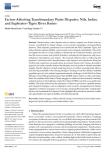
Article
Transboundary water disputes arise as nations compete over shared water resources, exacerbated by climate change, socio-economic inequalities, and geopolitical tensions. These disputes, prominent in river basins like the Nile, Euphrates?Tigris, [...]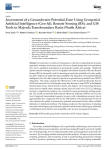
Article
Y. Ayadi ; M. Gentilucci ; K. Ncibi ; R. Hadji ; Y. Hamed |Groundwater in northwest Tunisia plays a vital role in supporting the domestic, agriculture, industry, and tourism sectors. However, climate change and over-exploitation have led to significant degradation in groundwater quality and quantity. Tr[...]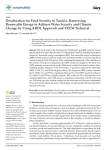
Article
This study employs the Autoregressive Distributed Lag (ARDL) model to investigate the short-term and long-term effects of independent variables, including Agricultural output (A), Renewable energy consumption (REC), Non-renewable energy consumpt[...]
Article
Morocco, a semi-arid country and a recognized climate change hotspot, faces increasing water scarcity, with renewable water resources estimated at 22 billion m3 in 2023. This study presents a critical literature review to examine, first, the eff[...]
Article
Water management in Morocco has become a central challenge at the intersection of climate variability, agricultural modernization, and resource governance. The country is increasingly confronted with extreme hydro-climatic conditions that threat[...]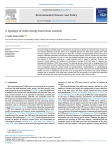
Article
The water-energy-food (WEF) nexus was introduced as an approach to address the combined water, energy, and food security challenges of the late 2000s. As an integrated approach, the WEF nexus combines these three resources together to measure an[...]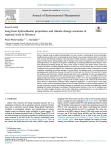
Article
Morocco urgently needs an updated understanding of its water resources, considering the current knowledge's insufficient and uncertain state. Incorporating the latest Shared Socioeconomic Pathways (SSPs) is crucial for a more accurate and inform[...]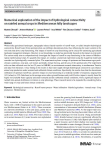
Article
M. Dhouib ; J. Molénat ; L. Prévot ; I. Mekki ; R. Zitouna-Chebbi ; F. Jacob |Within hilly agricultural landscapes, topography induces lateral transfers of runoff water, so-called interplot hydrological connectivity. Runoff water from upstream plots can infiltrate downstream plots, thus influencing the water content in th[...]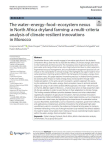
Article
Smallholder farmers, who mostly engage in low-value agriculture in the drylands of Northern Africa, were the first to have felt the effects of climate change, with threats to their livelihoods and food security. The increasing costs of agricultu[...]










